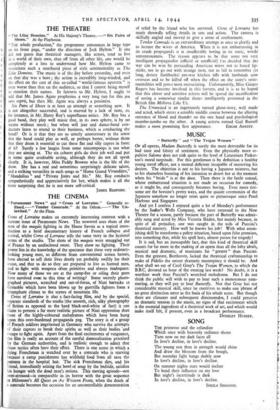THE CINEMA "Paramount News" and " Cross of Lorraine." Generally re-
leased.—" Tender Comrade." At the Odeon.—" The Un- invited." At the Plaza.
Cross of Lorraine makes an extremely interesting contrast with a current issue of Paramount News. The newsreel uses shots of the men of the maquis fighting in the Haute Savoie as a topical intro- duction to a brief documentary history of French collapse and revival, whilst Cross of Lorraine tells the same story in the fictional terms of the studio. The shots of the maquis were smuggled out of France by an undisclosed mute. They show no fighting. Their power lies in the knowledge of the spectator that these very ordinary- looking young men, so different from conventional screen heroes, have elected to sell their lives dearly yet probably swiftly for their cause, and that to do- so they are prepared to live as hunted men, and to fight with weapons often primitive and always inadequate. How many of those we see at the camp-fire or oiling their guns have survived even to this time of writing? Some secretly photo- graphed pictures, scratched and out-of-focus, of Nazi barracks at Grenoble which have been blown up by guerrilla fighters form a triumphant climax to the scenes of mountain life.
Cross of Lorraine is also' a fact-facing film, and by the special, separate standards of the studio (the smooth, rich, silky photography of fiction as opposed to the hard black-and-white of fact) it can claim to present a far more realistic picture of Nazi oppression than most of the highly-coloured melodramas which have been hung upon this over-burdened propaganda peg. The story is of a group of French soldiers imprisoned in Germany who survive the attempts of their captors to break their spirits as well as their bodies 'and escape to fight again. Apart from the final excitements of vengeance, the film is really an account of the careful demoralisation practised by the German authorities, and is realistic enough to admit that these tactics often have their effect. There is one scene in which a dying Frenrhman is watched over by a comrade who is starving because a camp punishment has withheld food from all save the patients in the hospital hut. The sick Frenchman dies, and his 'riend, immediately seizing the bowl of soup by the bedside, satisfies his hunger with the dead man's rations. This moving episode—not over-stressed—is comparable in its horror with the great sequence in Milestone's All Quiet on ti.e Western Front, when the death of a comrade becomes the occasion for an uncontrollable demonstration
of relief by the friend who has survived. Cross of Lorraine has matiy shrewdly telling details in sets and action. The camera is skilfully angled and moved to give a sense of confinement.
Tender Comrade is an extraordinary attempt at once to glorify and to lecture the wives of America. When it is not embarrassing in its crude propaganda it is insufferably boring in its static, wordy sententiousness. The reason appears to be that some not very intelligent propagandist (official or unofficial) I-as decided that the war can be won by persuading American wives not to hoard lip- sticks, not to go out with strange men, not to fail to remember (in long, dreary flashbacks) pre-war kitchen tiffs with husbands now overseas and to be killed off when the effect on the story's send- mentalities will prose most excruciating. Unfortunately, Miss Ginger Rogers has become involved in this farrago, and it is to be hoped that this clever and sensitive actress will be spared the mortification of seeing a somewhat similar thenv: intelligently presented in the British film Millions Like Us.
The Uninvited is an ingeniously turned ghost-story, well made and acted, which steers a sensible middle course between the alluring extremes of blood and thunder on the one hand and psychological mumbo-jumbo on the other. A young actress named Gail Russell
makes a most promising first appearance. EDGAR ANSTEY.


























 Previous page
Previous page